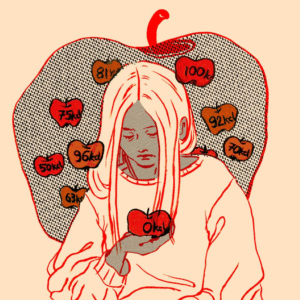16-year-old Sofia explores how social media promotes a negative body image and low self-worth

‘77% of Gen Z report that social media affects the way they compare themselves with others.’
Picture by: OXSF
Article link copied.
November 7, 2025
My experience with an eating disorder: The cost of comparison

Trigger warning: eating disorders
Almost two years ago, I used to go to dance classes. It was quite a bittersweet experience. I loved learning new choreographies and moving my body, but I hated how every day seemed to unlock a new insecurity.
We would dance in front of a large mirror, and I’d constantly look at the other girls, comparing myself to them. It felt relatively harmless – until my eyes landed on a 19-year-old brunette. I was 14 at the time, so comparing myself to her was kind of ridiculous. We were at completely separate stages of development, and at that age it makes a huge difference.
From that day on, I started hating both my personality and, especially, my body. I’d constantly trouble myself with the same thought: “How do I become like her?”
Harbingers’ Weekly Brief
This tendency to compare ourselves with others has become increasingly normalised over the last few years, largely due to social media. In fact, 77% of Gen Z reports that social media affects the way they compare themselves with others, whether in their appearance, achievements or lifestyle.
Even though I was already skinny, in my mind, becoming more like the girl from my dance class meant I needed to lose weight. It felt like the only thing I could control, since I couldn’t speed up my physical development, change my skin tone, alter my facial features, or reshape the way my body was built.
Too little food, too much exercise
I started by removing everything considered ‘unhealthy’ from my diet – at first, it was just cakes on my friends’ and family members’ birthdays, sweet treats, pizza, that kind of thing. At the time, my mom even said she was proud of me and praised my self-discipline. Little did she know that the reason I was doing it was coming from the wrong place.
Soon enough, my ‘diet’ expanded to eliminating bread, cookies and other everyday foods. On top of that, I began working out at home every single day, even on the days I already had dance classes. At that point, it didn’t feel too harmful – but of course, it was quickly becoming increasingly restrictive.
Within a couple of months, I was only having a few small meals spaced far apart throughout the day. Alongside this, I went for walks aimed at burning a specific number of calories and worked out every day of the week.
That made me lose too much weight, and I noticed just how much skinnier I had become compared to the girl I wanted to look like. But instead of seeing it as a sign to stop, I simply changed my goal. Now, I aimed to look like a supermodel, inspired by a mix of Victoria’s Secret and “heroin chic” aesthetics.
Though I hated to admit it, I was already struggling with an eating disorder.
Eating disorders are now more prevalent than ever. Statisticsfrom the US show that 9% of the country’s population has an eating disorder at least once in their lifetime. They cause around 10,200 deaths each year – that’s one death every 52 minutes in the US alone as a direct result of an eating disorder.
Not only was I eating little and burning a lot of calories, but I also allowed myself to eat only at specific times and would crash out if that routine was disrupted. In addition, I developed a fear of food that isn’t “clean”.
I’ve never gone to a doctor to confirm it, but my behaviour looked very much like a mix of orthorexiaand anorexia.
After six months, I had gotten so skinny that my parents felt they had to step in. It wasn’t bad enough to get hospitalised, but it wasn’t pretty either. I was constantly edgy, eating almost nothing, working out obsessively, clinging to my routines. I stopped menstruating. Social media was only making it worse. The content that appeared on my feed normalised – and even romanticised – extreme skinniness.
However, I didn’t feel like it was that big a deal and I didn’t want to gain weight. Not until people started saying “You’re really skinny”, “Are you OK?” and “You look pale.” That was when I began noticing the change and feeling insecure.
And I couldn’t ignore the clear signs that my body was struggling: losing my period, having thinner hair, the constant feeling that I might faint. I realised that I didn’t want to be that thin – it didn’t feel good physically.
Still, it wasn’t enough for me to take action on my own; I was panicked about the slightest thought of gaining weight and it took my parents’ insisting for me to actually do something.
Making positive changes
My mom and I started keeping a notebook where every evening we planned my meals for the next day. It was meant to help me eat more, and in a way, it did – following the notebook gave me a sense of control and structure, which I really needed at the moment. But every meal left me with a stomach ache and the guilt of having eaten more than I ‘should’. But at least I was eating more.
My parents also made me stop exercising, promising that I could go to the gym instead of working out at home, but only after I reached the appropriate weight for my age and height.
It took me a while, but the journey became easier once I reached a healthier weight and started doing proper exercise while eating more. Slowly, I began to notice subtle changes – I was building muscle, my body was becoming stronger, and I was starting to look more feminine. For the first time in a long time, I actually liked what I was seeing in the mirror.
This made me realise something pretty important that shifted my mindset completely: I’ve always been drawn to a sporty, toned figure, not the extremely thin one I had been chasing. Social media had gaslit me into wanting a body that wasn’t even my ideal – it pushed me toward an unrealistic standard that didn’t even reflect my true preferences. What was I even torturing myself for then?
In hindsight, I can also see how unhealthy my previous obsession had been, both physically and mentally. It was driven by comparison and external pressure rather than what genuinely made me feel confident, beautiful or healthy.
Some effects of my ED have lasted longer than I expected: for months, I couldn’t let go of scheduling my meals obsessively, and my periods didn’t return for another year.
I feel so much better now that I’ve recovered. I have more energy, I can focus on things I enjoy, and my relationship with food has slowly started to feel less strained.
During my eating disorder, I even completely stopped talking to my brother, simply because I felt like he was emotionally draining me – and at the time, I didn’t have anything to give. But as I gained healthy weight and started taking care of myself properly, that changed. This made me understand how recovery is about so much more than physical health. I’d even say it’s mainly about emotional and social well-being.
Society often overlooks pushing unrealistic standards, without acknowledging the long-term damage it can cause. If they really understood the image they’re glorifying, maybe fewer young people would base their worth on a number or an unachievable physical trait.
Because that’s not what matters. For me, it took nearly breaking to figure that out.
If you need information or support with eating disorders, try the following:
- Beat (UK)
- First Steps ED (UK)
- NEDA (US)
- ANAD (US)
- Butterfly (Australia)
Written by:

Culture Section Editor 2025
Vergel, Spain
Born in 2009 in Kyiv, Sofia moved to a town in Spain close to Valencia in 2020. With her ability to quickly learn languages, she adjusted to her new life seamlessly.
Sofia is an aspiring sports broadcast journalist. She’s passionate about a wide range of subjects including culture, cinema and global affairs.
She joined Harbingers’ Magazine in the summer of 2023, and since then, she began to consistently explore the intersections of culture, creativity, and society. This, along with Sofia’s exceptional writing skills, led to her promotion as the Culture Section Editor at Harbingers’ Magazine in March 2025. Simultaneously, she serves as the Afghanistan Newsroom Editor.
In her free time, Sofia stays busy doing fitness, traveling to new places, and writing short stories.
Sofia speaks Ukrainian, Spanish, English, and Russian.
Edited by:

🌍 Join the World's Youngest Newsroom—Create a Free Account
Sign up to save your favourite articles, get personalised recommendations, and stay informed about stories that Gen Z worldwide actually care about. Plus, subscribe to our newsletter for the latest stories delivered straight to your inbox. 📲
© 2025 The Oxford School for the Future of Journalism


